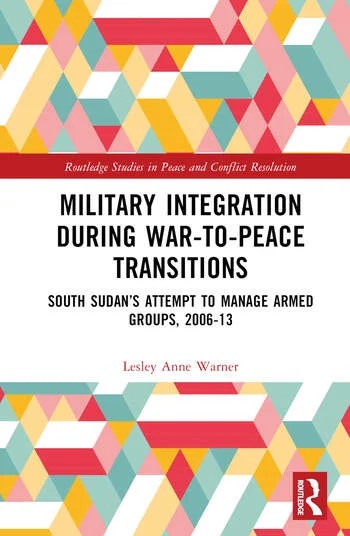I’m excited to announce that my dissertation has been published as Military Integration during War-to-Peace Transitions: South Sudan’s Attempt to Manage Armed Groups, 2006-13!
In the 1960s, only 10% of peace agreements included some element of political-military accommodation – namely, military integration. From Burundi to Bosnia to Zimbabwe, that number had increased to over 50% by the 2000s. However, relatively little is understood about this dimension of power-sharing often utilized during war-to-peace transitions. Beyond the deep dive into a case of what not to do during war-to-peace transitions, this book provides several contributions to the theoretical and empirical body of literature on how to manage spoilers during fragile transitions – especially during concurrent disarmament, demobilization, and reintegration (DDR) and security sector reform (SSR) processes:
- During such transitions, governments can fight armed groups, ignore them and accept that they lack a monopoly on the use of force within the country, or seek political-military accommodation with them through military integration. In some cases, integration can be the ‘least bad’ option.
- The combination of an open-ended integration process and failed demobilization initiatives can increase pressure on the military integration process.
- A disconnect between the military integration process and broader defense sector reform efforts can contribute to the security sector being rebuilt on an unstable foundation.
- A de facto open-ended military integration process can make it more difficult for a military to focus on cohesion and professionalization, which risks making the force prone to fracturing during periods of heightened political competition.
- Military power-sharing arrangements cannot overcome failed political accommodation efforts, and can even become more vulnerable as political power-sharing arrangements erode.
- Although integration may help warring parties temporarily overcome wartime factionalism and avert conflict in the short term, the process can even contribute to instability if the process is not well-implemented as a transitional security mechanism.
The conclusions I reached were based on interviews conducted in South Sudan, Ethiopia, and Kenya between 2012 and 2014 with individuals who directly managed or facilitated South Sudan’s integration, DDR, and SSR processes between 2006 and 2013.
If you want to grab a copy, use the code AFL02 to receive 20% off until September 30, 2023!
